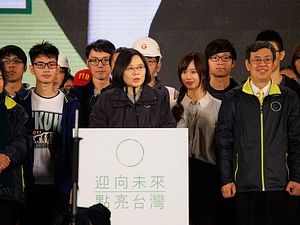Joseph A. Bosco is a member of the U.S.-China task force at the Center for the National Interest and a senior associate at the Center for Strategic and International Studies. He previously served as China country desk officer in the office of the secretary of Defense from 2005-2006.
Tsai Ing-wen is now president of Taiwan. Her inaugural address struck a decidedly moderate and conciliatory tone when addressing the sensitive issue of Taiwan’s relations with China.
But the Chinese Communist Party found it too “ambiguous” and believes she needs to go back to school until she gets it right. Beijing proclaimed:
She did not explicitly recognize the 1992 Consensus and its core implications, and made no concrete proposal for ensuring the peaceful and stable growth of cross-Straits relations. Hence, this is an incomplete test answer.
What is really incomplete, however, is not Tsai’s “answer,” but China’s “test.” Beijing presumes to judge Taiwan on the degree to which its leaders are willing to accept a national destiny as an appendage of China. But the people of Taiwan, and the international community, have other, more noble, criteria for assessing Taiwan’s value, and in those arenas, it receives very high grades indeed.
Domestically, Taiwan has made the remarkable transition from dictatorship to democracy. Its system encourages a vibrant multi-party competition in governance that has already seen six successful presidential elections and three peaceful transfers of power between opposing parties.
Yes, its democratic development is not yet “complete” and there is room for improvement, but after 229 years, the United States itself, the world’s oldest democracy, is still pursuing “a more perfect union.”
As for Taiwan’s place in the community of nations, despite its formal exclusion from most international institutions, it is widely admired as a model citizen of the world. Its contributions to science and medicine are legion and it punches way above its weight in the area of humanitarian assistance and disaster relief.
On regional security, Taiwan is an active participant in the Proliferation Security Initiative. It advocates peaceful resolution of disputes on the basis of international law and threatens no other claimant in the complex array of maritime issues in the East and South China Seas.
Now, since Beijing has introduced the subject of grading, it is worth taking a look at how China measures up on the scale of international norms and universal values. To do that, some historical context is necessary.
Put aside the role of the People’s Republic in helping to launch the Korean War (for which it was condemned as an aggressor by the United Nations), its invasions of East Turkestan and Tibet, its part in perpetuating the Vietnam War, its spread of Wars of National Liberation.
Start instead with the China former U.S. President Richard Nixon described in 1967 when he laid out his vision for a new relationship between China and the world:
We simply cannot afford to leave China forever outside the family of nations, there to nurture its fantasies, cherish its hates and threaten its neighbors.
There followed more than four decades of Western recognition, engagement, trade, aid, technical and technological assistance, all intended to welcome China into the international community. The People’s Republic is now well within the family of nations, and yet, by its behavior in a myriad of ways, it still “nurtures its fantasies, cherishes its hates, and threatens its neighbors.”
Moreover, promises Beijing made along the way, explicit, and implicit, that it would begin on the path to political liberalization (as South Korea and Taiwan did) have been forgotten or outright repudiated.
Xi Jinping rejects the kind of democratic language the world heard repeatedly from Wen Jiabao and others. His “China Dream” is threatening to have more in common with Mao Zedong’s nightmare.
While Tsai Ing-wen has been temperate and tactful in her official language toward China, the Taiwanese people have given a more “complete” answer to Beijing’s demands for political integration: No.
When China finally gets that message, it may well decide to invoke its Anti-Secession Law that asserts a “right” to use force if “the possibilities for a peaceful reunification should be completely exhausted.”
At that point, it will be the United States that will be subjected to China’s test. It would be better for all parties if Washington lets Beijing know long before that what its “complete answer” will be.
































